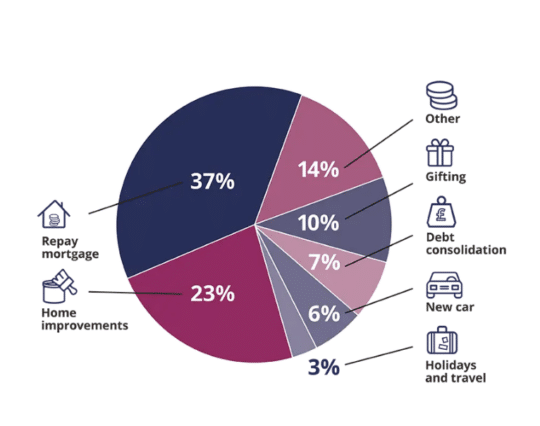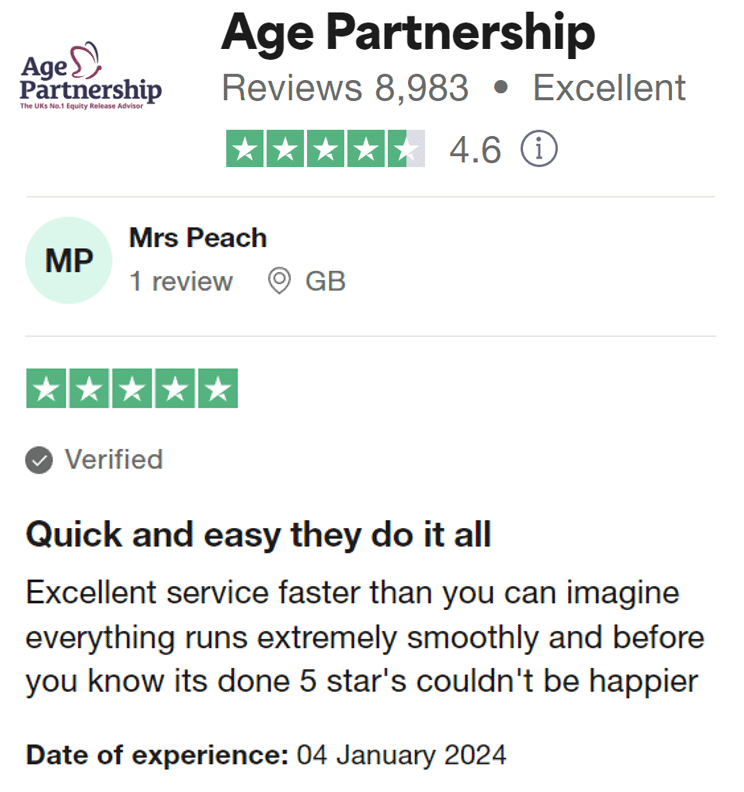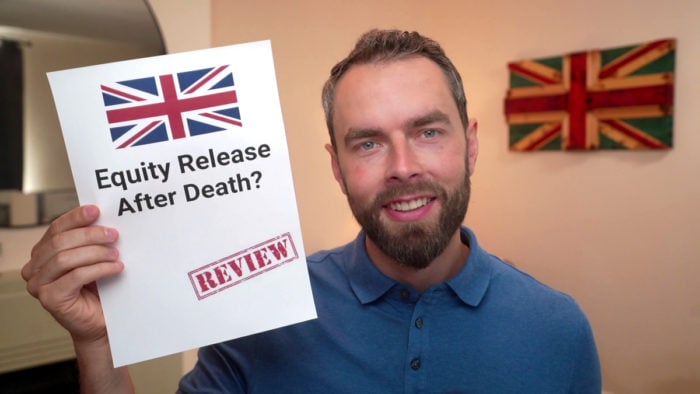What Is the Alternative to Equity Release if You’re Under 55? Guidance & more
Our preferred equity release adviser is Age Partnership. For free and impartial money advice you can visit MoneyHelper.

Our preferred equity release adviser is Age Partnership. For free and impartial money advice you can visit MoneyHelper.
Are you keen to know more about equity release plans? Do you wonder if you can release equity from your house if you are under 55? If so, you’re in the right place. This guide will help you understand your options, even if you’re too young for traditional equity release schemes.
Over 7,000 people visit us each month to get advice about equity release. Using this expert knowledge, we’ll explain:
- What exactly equity release is.
- How you can get a realistic quote.
- The pros and cons of equity release schemes.
- Myths and misunderstandings about equity release.
- Alternatives to equity release if you’re under 55.
Equity release can be a bit tricky to get your head around, especially if you’re under 55. But don’t worry; we understand your concerns. We’re here to guide you through the process, offering clear, simple advice.
How do seniors release equity?
Seniors do not have the same access to loans that let you borrow against equity because they may be considered too old or are no longer employed. Some seniors can still access home equity loans, but they can have more success using an equity release scheme.
Equity release is a method of borrowing against home equity exclusive to seniors. No monthly repayments are due on the loan amount or any interest when applied. Instead, the loan is repaid when the home is eventually sold, either after the homeowner dies or moves into long-term care.
A lifetime mortgage and a home reversion equity release plan are the two methods that seniors use to release equity. You can find details on both types of equity release below.
1. Lifetime mortgage
A lifetime mortgage allows the senior homeowner to receive a lump-sum or drawdown facility of up to around 60% of their home equity at best. This mortgage charges a fixed interest rate for the entirety of the loan term. Neither the loan amount nor interest needs to be repaid. The interest rolls up and makes the total debt grow bigger each month.
Some people choose to make voluntary interest repayments to prevent the debt from escalating significantly, which is what happens over time. If you borrow around £60,000 at a standard interest rate, the amount you will owe from your eventual property sale proceeds can easily be more than double this amount after 10-15 years.
There are some variations of lifetime mortgages, such as an interest-only lifetime mortgage, or an enhanced lifetime mortgage. An enhanced lifetime mortgage works exactly the same as explained above. But the key difference is that during the application process, the homeowner can submit a health questionnaire and medical records to prove they have a reduced life expectancy. If approved, they can then access more equity to help with medical costs or other expenses.
2. Home reversion plans
A home reversion plan is not as common as lifetime mortgages but it remains an option in the UK. The homeowner can again choose from a lump sum or drawdown, but no interest is charged on the loan amount. The lender ensures they make a profit on the loan by getting the homeowner to agree to give them a percentage of the future sale proceeds double or even triple the percentage of the equity released.
For example, taking out 20% equity (£40,000) from a £200,000 home might mean giving up 50% of the future sale value. If the property were to increase by 10% then you would pay back £120,000 for your £40,000 loan.
3. Reverse mortgage
A reverse mortgage allows you to access large amounts of your home equity as a lump sum payment, through monthly instalments or a line of credit. I’ve written a detailed guide about reverse mortgages for you to compare against a home equity loan.
» TAKE ACTION NOW: Find out how much equity you could release
What is the minimum age?
Most equity release plans have a minimum age requirement of 55 years old. Some equity release plans set older age requirements, possibly 60 or even 65 years old.
You should not consider removing someone from the property ownership to become eligible to apply for an equity release plan (because they do not meet the age requirement). This could be dangerous and result in the younger partner being made homeless in the future.
There are additional criteria to meet to get an equity release scheme. The home you release equity from must be your main residence and it must be of a minimum value, typically around £75,000 with most lenders.
How equity release could help
More than 2 million people have used Age Partnership to release equity since 2004.
How your money is up to you, but here’s what their customers do…
Find out how much equity you could release by clicking the button below.
In partnership with Age Partnership.
Can I release equity at 50?
You will not be able to do an early equity release at 50 years old with an equity release plan. This is because most equity release providers set a minimum age requirement above this age. There are also certain equity release eligibility criteria you need to meet, regardless of your age.
Even if you are a joint homeowner with an older partner, you won’t be able to use equity release products until you meet the age requirement. This is because the youngest homeowner is subject to the age requirement.
What is the age limit?
There is no upper age limit for equity release. If you apply as someone who easily exceeds the minimum age requirement – usually 55 – then you may receive a better deal. Martin Lewis went on record to say that lifetime mortgages should be left until as late as possible. This is because the later you leave them, the less interest that they will incur until you die or move into care.
Join thousands of others who release equity
Age Partnership have helped over 2 million people release equity from their home.

Mrs Wareham
“I am more than pleased to have taken out Equity Release with Age Partnership.”
Reviews shown are for Age Partnership. Search powered by Age Partnership.
Equity Release Myths and Misunderstandings
There are a lot of myths and misunderstandings surrounding equity release, and I’m often asked about these. Here are some myths and misunderstandings about equity release:
- You can end up owing more than your home is worth. This isn’t true. If you take out an equity release plan with a provider that’s approved by the ERC (Equity Release Council), you will never owe more than the value of your home when it’s sold. This is because your plan will come with a no-negative-equity guarantee.
- You no longer own your home. This is also untrue. You are borrowing against the value of your property and remain the owner.
- You won’t be able to leave anything to your loved ones. There are now a plethora of plans that are available which allow you to protect some of your equity for inheritance purposes.
- You’re tied down with monthly payments. There are no obligations to make any monthly payments unless you choose to do so. Some homeowners choose to do this to reduce the amount that will eventually need to be paid back when they either pass away or go into long-term care.
Are there alternatives?
If you cannot apply for a lifetime mortgage or other equity release plan because you are not at least 55 years old, there are some alternative options. There are loans you might qualify for and some more innovative ideas to create money for home improvements, holidays, medical bills or any other purpose.
Alternatives to equity release schemes (if you’re under 55)
Can you get equity release under 55? No, but here are the alternative options. Below you can find five alternatives to equity release if you are under 55.
1. Second charge mortgages
A second-charge mortgage is an umbrella term for any additional loan applied to a property with an existing first-charge mortgage. For context, a first charge mortgage is a long-winded name for general mortgages used to help buy residential property. So, if you add another secured loan to your home based on your home equity, this is a second-charge mortgage.
Second-charge mortgages are available to people of all ages as long as they can afford repayments. They are mostly taken up by younger homeowners wanting to release some of the home equity they have built up through regular first-charge mortgage payments.
The money can be used for any purpose but is usually used to make home improvements, which can subsequently increase property value and home equity again.
2. Home equity loans
Home equity loans provide the homeowner with a loan as a lump sum that is charged with a fixed interest rate. The loan along with the interest must be repaid each month for a fixed duration so that the loan is cleared. They can be a beneficial way to borrow larger amounts than what is available through personal loans and credit cards, while also getting a competitive interest rate.
3. Home equity line of credit (HELOC)
A home equity line of credit is the same as a home equity loan but they do have some key differences. The first and biggest difference is how the money is paid out. The money is available through instalments over a draw period, which may be as long as two years. Be sure to check home equity loan rates with your financial adviser.
During this time, the homeowner only has to make interest repayments. After the draw period ends, both capital loan and interest repayments are due each month until the loan is repaid. With a HELOC, the interest is often charged at a variable rate instead of a fixed rate.
4. Remortgaging to release equity
Instead of adding a separate secured loan to your home, another option is to extend your current first-charge mortgage. Either with the same lender or another one, you could switch your current mortgage for another one while simultaneously borrowing some more against your home equity.
For example, let’s imagine you have a £200,000 home with a £100,000 existing mortgage. You then swap your current mortgage for a new one by asking to borrow £130,000.
The first £100,000 will be needed to repay the original mortgage deal, and then an additional £30,000 is borrowed against your home equity and repaid within the mortgage repayments. This £30,000 can be used on anything you wish, such as a new kitchen, holidays, etc.
5. Downsizing your home
Downsizing from your current home to another one will help to create a savings nest egg. If you urgently need money, this may be a good option before returning to the idea of equity release. And if you manage to create a sizable pool of money by downsizing, you may even be able to delay using equity release longer and get a better deal.
Just remember to consider the other fees, costs and stress associated with moving home, such as legal fees and stamp duty.
6. Rent out a room in your home
If you do not want to downsize, another option is to rent out a room or part of your home until you are able to release equity. Doing so will create a continuous income stream and could tie you over until you reach 55 and can use an equity release plan. Or you may decide that renting a room out is even better than equity release for your circumstances.
Keep in mind that the money you receive needs to be declared to HM Revenue and Customs and is subject to tax.
7. Start saving smarter
Until you meet the age requirement of equity release, you could try making the money you do have stretch further. MoneyNerd has scores of guides and resources available to help your budget, track and save more. And if you’re dealing with debts and arrears, you could benefit from reading our debt solutions page.


